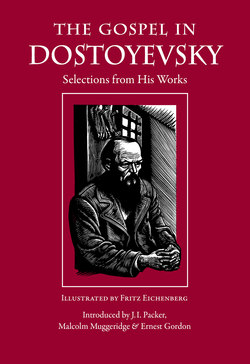Читать книгу The Gospel in Dostoyevsky - Fyodor Dostoyevsky - Страница 14
На сайте Литреса книга снята с продажи.
ОглавлениеThe Devil
This is a delirious dream of Ivan Karamazov. It is probably unique in world literature as an attempt to portray how the uncontrolled ego of a conscious atheist expresses itself, an atheist who knows a great deal more about God than most believers. The dream has only an inner connection with the novel as a whole. Ivan is physically ill as well. His illness (“brain fever”) was caused by outer circumstances, but its hallucinations come from the deepest emotional content of his subconscious.
Ivan had just had a bad shake-up after the onset of his illness. Smerdyakov, the servant and illegitimate son of Ivan’s murdered father, had confessed to him that it was he who had murdered the older Karamazov, not Ivan’s half-brother Dmitri, who was in prison for the crime. To prove the truth of his confession, Smerdyakov handed Ivan the 3000 rubles for the sake of which he had committed the murder. He went on to say that it was Ivan himself who had incited him to commit the crime – not only through his godless talking, his continual denial of God’s existence. Smerdyakov had been firmly convinced after an exchange with Ivan before the murder that in committing it he would be acting according to Ivan’s wishes. Ivan cannot possibly doubt the sincerity of these confessions. Accordingly, he suddenly sees himself as his father’s murderer. To escape despair, he now needs God, whom he was unwilling to recognize before.
I AM NOT A DOCTOR, but yet I feel that the moment has come when I must of necessity give the reader some account of the nature of Ivan’s illness. Looking ahead, I can say at least one thing: he was at that moment on the very eve of an attack of brain fever. Though long affected by it, his health had offered a born resistance to the fever that in the end gained complete mastery. Though I know nothing of medicine, I venture to suggest that perhaps he really had, by a terrible effort of will, succeeded in delaying the attack for a time, hoping of course to check it completely. He knew that he was unwell, but he loathed the thought of being ill at that fateful time, at the approaching crisis in his life, when he needed to have all his wits about him, to say what he had to say boldly and resolutely, and “to justify himself to himself.”
He had, however, consulted the new doctor, who had been brought from Moscow by a fantastic notion of Katerina Ivanovna’s to which I have referred already. After listening to him and examining him, the doctor came to the conclusion that he was actually suffering from some disorder of the brain and was not at all surprised by an admission that Ivan had reluctantly made to him. “Hallucinations are quite likely in your condition,” the doctor said, “though it would be better to verify them…you must take steps at once, without a moment’s delay, or things will go badly with you.” But Ivan did not follow this judicious advice and did not take to his bed to be nursed. “I am walking about, so I am strong enough; if I drop, it will be different – then anyone may nurse me who likes,” he decided, dismissing the subject.
And so he was sitting, almost conscious himself of his delirium, and as I have said already, looking persistently at some object on the sofa against the opposite wall. Someone appeared to be sitting there, though goodness knows how he had come in, for he had not been in the room when Ivan came into it on his return from Smerdyakov. This person or, more accurately speaking, this Russian gentleman of a particular type, no longer young, “had made his fiftieth” as the French say, with rather long, still thick, dark hair, slightly streaked with grey, and a small pointed beard. He was wearing a brownish reefer, rather shabby but evidently made by a good tailor and of a fashion that had been discarded by the smart and well-to-do for the last two years. His linen and his long scarflike necktie were such as are worn by people who aim at being stylish, but on closer inspection his linen was not overclean and his wide scarf was very threadbare. The visitor’s check trousers were of excellent cut but were too light in color and too tight for the present fashion. His soft fluffy white hat was out of keeping with the season.
